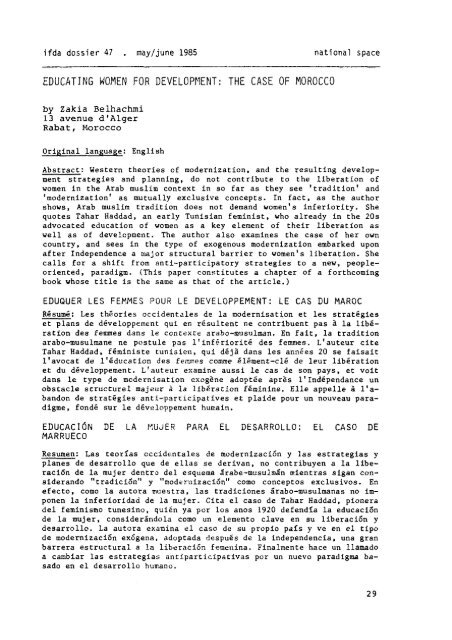Ifda dossier 47, May/June 1985
Ifda dossier 47, May/June 1985
Ifda dossier 47, May/June 1985
Create successful ePaper yourself
Turn your PDF publications into a flip-book with our unique Google optimized e-Paper software.
ifda <strong>dossier</strong> <strong>47</strong> . may/june <strong>1985</strong> national space<br />
-P- --<br />
EDUCATING WOMEN FOR DEVELOPMENT: THE CASE OF MOROCCO<br />
by Zakia Belhachmi<br />
13 avenue d'Alger<br />
Rabat, Morocco<br />
Original language: English<br />
Abstract: Western theories of modernization, and the resulting develop-<br />
ment strategies and planning, do not contribute to the liberation of<br />
women in the Arab muslim context in so far as they see 'tradition' and<br />
'modernization' as mutually exclusive concepts. In fact, as the author<br />
shows, Arab muslim tradition does not demand women's inferiority. She<br />
quotes Tahar Haddad, an early Tunisian feminist, who already in the 20s<br />
advocated education of women as a key element of their liberation as<br />
well as of development. The author also examines the case of her own<br />
country, and sees in the type of exogenous modernization embarked upon<br />
after Independence a major structural barrier to women's liberation. She<br />
calls for a shift, from anti-participatory strategies to a new, people-<br />
oriented, paradigm. (This paper constitutes a chapter of a forthcoming<br />
book whose title is the same as that of the article.)<br />
EDUQUER LES FEMMES POUR LE DEVELOPPEMENT: LE CAS DU MAROC<br />
Resume: Les theories occidentales de la modernisation et les strategies<br />
et plans de d6veloppement qui en resultant ne contribuent pas 2 la lib6-<br />
ration dea femmes dans Ie contexte arabo-musulman. En fait, la tradition<br />
arabo-musulmane ne postuie pas l'infGriorit6 des femmes. L'auteur cite<br />
Tahar Haddad, feministe tunisien, qui d6j2 dans les arm6es 20 se faisait<br />
l'avocat de 1'6ducation des felaves come element-cl6 de leur liberation<br />
et du d6veloppement. L'auteur examine aussi le cas de son pays, et volt<br />
dans 1e type de modernisation cxogSne adoptee aprzs l'Ind6pendance un<br />
obstacle structure1 majeur a la liberation feminine. Elle appelle 2 1'a-<br />
bandon de strategies anti-parcicipatives et plaide pour un nouveau para-<br />
digme, fond6 sur Ie d6veloppement hucain.<br />
EDUCACI~N DE LA M~JJER PARA EL DESARROLLO: EL CASO DE<br />
MARRUECO<br />
Resumen: Las teorias occidcntales de modernizaci6n y las estrategias y<br />
planes de desarrollo que de ellas se derivan, no contribuyen a la libe-<br />
raci6n de la mujer dentro del esquema Zrabe-musulmZn mientras sigan con-<br />
siderando "tradici6n1' y "modertiizaci6n1' como conceptos exclusivos. En<br />
efecto. como la autora nuestra, las tradiciones Zrabo-musulmanas no im-<br />
ponen la inferioridad de la mujer. Cita el caso de Tahar Haddad, pionera<br />
del feminism0 tunesino, qui6n ya por 10s anos 1920 defendia la education<br />
de la mujer, consider5ndola como un element0 clave en su liberation y<br />
desarrollo. La autora exanina el caso de su propio pals y ve en el tip0<br />
de modernizaci6n exogena, adoptada despu6s de la independencia, una gran<br />
barrera estructural a la liberation femenina. Finalmente hace un llamado<br />
a cambiar las estrategias antiparticipativas por un nuevo paradigms ba-<br />
sad0 en el desarrollo humane.
















